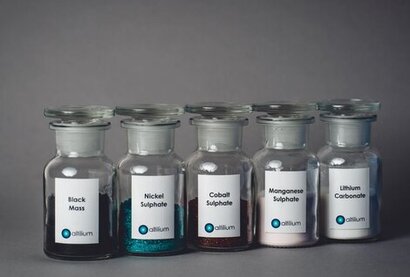
The cutting-edge facility, the first of its kind in the UK, marks the next phase of Altilium’s scale-up strategy, leading to megascale recycling at its planned ACT 4 plant in Teesside. Showcasing the company’s advanced EcoCathode process, it will be the only plant in the UK capable of producing large volumes of precursor cathode active materials (P-CAM) and cathode active materials (CAM) from recycled EV battery waste.
The 18,000 square foot facility has the capacity to process 300kg of black mass waste (the equivalent of one EV battery) per day, enabling production of high volumes of battery materials for qualification with automotive customers. This will include high-nickel NMC811 CAM for production of battery cells at the UK Battery Industrialisation Centre (UKBIC), for validation with a leading automotive OEM.
For the UK, the opening of the ACT 2 facility represents a critical step toward reducing the country’s reliance on imported raw materials and developing a sustainable, domestic supply chain for the critical raw materials essential for EV manufacturing.
As noted in a recent IEA report, battery recycling will be critical to meeting the growing demands of EV and energy storage deployment and reducing the need for mined materials, especially for those countries with limited domestic resources.
By recovering these critical minerals from end-of-life EV batteries and Gigafactory waste, Altilium is supporting the growth of a globally competitive battery supply chain in the UK, as well as minimising the carbon footprint of battery manufacturing, making EVs even greener. An independent lifecycle analysis (LCA) has found that NMC532 cathode produced using Altilium’s recycled materials could be up to 74 percent lower in climate change impact compared to using primary mined materials from a Chinese supply chain.
“This is a proud moment for Altilium and a major milestone for the UK’s circular economy” said Dr Christian Marston, President and COO of Altilium. “ACT 2 is not only a demonstration of our technological leadership but also of our commitment to building a sustainable future. With ACT 2 starting processing, we are closer than ever to achieving a domestic supply chain for EV battery materials, a critical component in achieving the UK’s industrial resilience.”
The opening of the ACT 2 facility follows the successful demonstration of Altilium’s proprietary technology at its ACT 1 site in Tavistock. The EcoCathode process has been independently validated and proven in a scaled-up pilot operation, recovering over 95 percent of cathode metals from waste EV batteries, in a format that can be directly reused in battery manufacturing.
Furthermore, electrochemical testing of cells produced from Altilium’s recycled CAM has shown comparable rate and cycle performance with commercially available CAM used in today’s high-nickel NMC 811 batteries.
Altilium’s process begins with black mass leaching, where the shredded battery waste is dissolved in acid solutions to extract key metals, including lithium, nickel, cobalt, and manganese. These critical materials are then separated and purified through solvent extraction, yielding battery-grade compounds. Finally, Altilium upcycles these recovered metals into high-nickel P-CAM, which is further synthesised into CAM – the most valuable component of a lithium-ion battery.
By recycling to high-value CAM, Altilium is fully closing the loop in the EV battery lifecycle, offering a complete end-to-end solution for automotive OEMs and battery manufacturers. This unique full battery circularity model encompasses the entire value chain, from EV battery collection, to black mass recycling and production of critical materials for supply to UK gigafactories.
According to forecasts from the Advanced Propulsion Centre, the UK will need over 150,000 tonnes of CAM a year by 2035, for the production of approximately 1.2 million EVs annually. Altilium’s ACT 4 plant will have the capacity to produce 30,000 tonnes of CAM a year, meeting 20 percent of that expected demand. The plant will also enable automotive OEMs to comply with stringent new EU battery regulations. By 2036, new EV batteries in the EU must include 12 percent recycled lithium, 5 percent recycled nickel and 26 percent recycled cobalt.
For additional information:

